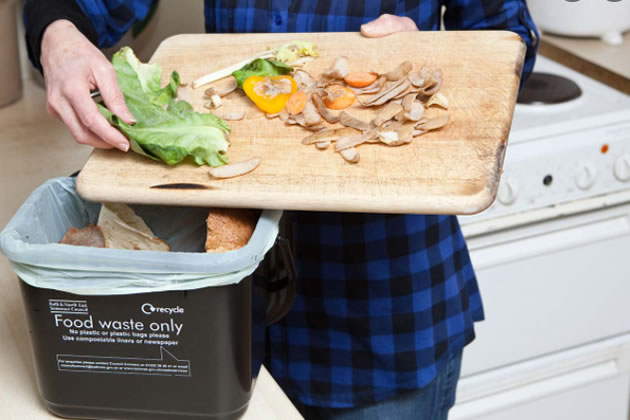Pilot scheme could lead to introduction across the borough

Many other boroughs already have food waste collection schemes
|
Extinction Rebellion Make Case For Food Waste Collection Wandsworth Council Justifies Changes In Refuse System 'Corner Cutting' Blamed for Refuse Collection Problems Register for your newsletter from: |
Wandsworth Council has made the first move towards food waste recycling in the borough with the launch of a pilot scheme in Southfields.
Around 2,300 households in the Southfields Grid area are being urged to take part in the pilot scheme.
The trial will help inform future decisions on the council’s next waste and recycling contract to commence in 2024.
Homes that take part will be given food caddies in which they can store their food waste. These will then be emptied weekly as part of the borough’s normal refuse and recycling collection service.
Last September members of Extinction Rebellion Wandsworth made a presentation to the council about the potential economic and environmental benefits of food waste collection. Wandsworth currently burns around 25,000 tonnes of food waste a year which is sent to the Belvedere incinerator.
Food waste collection would also provide a way to boost Wandsworth’s relatively low recycling rate which ranked them 341 out of 345 among local councils in 2018/9 with a recycling rate of just 23.2%
Extinction Rebellion Wandsworth says implementing a food waste collection, and sending it to a commercial composting facility, could save £4 million on processing fees every year.
The council’s environment spokesman Cllr Steffi Sutters said, “The council has set itself some tough environmental targets to reduce its carbon emissions and become a carbon neutral council by 2030 and a zero-carbon authority by 2050.
“This means we are examining and evaluating everything we do to see what changes we need to make to achieve these ambitious targets.
“We are proceeding with a limited pilot scheme to begin with to see how well it works. We know from other areas that have introduced similar initiatives that there are barriers to take up participation and we want to get a better understanding of these.
“Lessons already learned in other boroughs are that although these schemes can work well initially, the amount collected tends to tail off quite significantly over time. Given the high cost of investment to bring this forward, it is important that we study the results of the pilot and work out what works best for our residents.
“The council’s main focus remains to actively encourage residents to reduce all forms of waste, including food, which is by far the best environmental outcome. Minimising the amount of waste material that needs to be collected and processed is a key element of our carbon reduction programme.”
At the moment this is sent by river barge, along with all the other waste items collected from the borough’s 144,000 homes, to the incinerator, which uses it in place of fossil fuels to generate electricity.
Food waste collected separately and diverted away from other waste streams will instead be sent to an anaerobic digestion plan where micro-organisms break it down and produce a biogas that is fed into the National Gas Grid. It also produces digestate which is used to improve agricultural soils.
Collecting food waste separately will require different vehicles than those used to collect the remaining household waste and recycling.
Homes in the Southfields Grid test area are being written to this week outlining the scheme’s details and how households can take part in the trial.
The council has also unveiled a home composting trial which could see food scraps, peelings and other organic waste processed in back gardens, providing homeowners with a ready source of nutrients for their plants and flowers.
Like Reading Articles Like This? Help Us Produce More This site remains committed to providing local community news and public interest journalism. Articles such as the one above are integral to what we do. We aim to feature as much as possible on local societies, charities based in the area, fundraising efforts by residents, community-based initiatives and even helping people find missing pets. We've always done that and won't be changing, in fact we'd like to do more. However, the readership that these stories generates is often below that needed to cover the cost of producing them. Our financial resources are limited and the local media environment is intensely competitive so there is a constraint on what we can do. We are therefore asking our readers to consider offering financial support to these efforts. Any money given will help support community and public interest news and the expansion of our coverage in this area. A suggested monthly payment is £8 but we would be grateful for any amount for instance if you think this site offers the equivalent value of a subscription to a daily printed newspaper you may wish to consider £20 per month. If neither of these amounts is suitable for you then contact info@neighbournet.com and we can set up an alternative. All payments are made through a secure web site. One-off donations are also appreciated. Choose The Amount You Wish To Contribute. If you do support us in this way we'd be interested to hear what kind of articles you would like to see more of on the site – send your suggestions to the editor. For businesses we offer the chance to be a corporate sponsor of community content on the site. For £30 plus VAT per month you will be the designated sponsor of at least one article a month with your logo appearing if supplied. If there is a specific community group or initiative you'd like to support we can make sure your sponsorship is featured on related content for a one off payment of £50 plus VAT. All payments are made through a secure web site. |
August 13, 2021